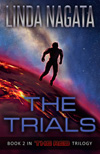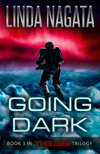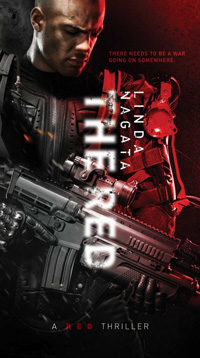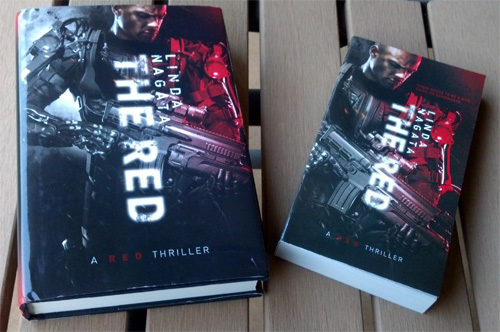Still she persisted…
Tuesday, March 21st, 2017A retrospective on the first thirty years of my writing career.
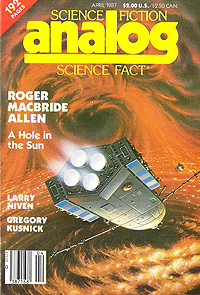 It’s been thirty years since my first publication. That was a short story called “Spectral Expectations” that appeared in Analog magazine. I was twenty-six years old at the time, a stay-at-home mom caring for my first baby, born just a couple of months earlier.
It’s been thirty years since my first publication. That was a short story called “Spectral Expectations” that appeared in Analog magazine. I was twenty-six years old at the time, a stay-at-home mom caring for my first baby, born just a couple of months earlier.
That was a different age. The Internet-as-we-know-it didn’t exist yet and all correspondence was via snail-mail. I don’t remember all the details, but I know I was thrilled when my copy of the magazine finally arrived. I was on my way!
Surely I was on my way?
The truth is, I didn’t make any sort of splash with my early stories and it took me another seven years to see my first novel in print. But after that I was definitely on my way. Never mind the low advance or that the novel was published as a mass-market paperback with no hardcover edition. As counterbalance it had a gorgeous Bruce Jensen cover and fantastic reviews. It even went on to win the Locus Award for best first novel and surely that meant readers were paying attention?
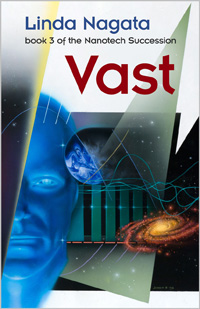 Three more novels quickly followed — and unfortunately for me I soon learned that most readers were not paying attention. All four novels — what today I call the Nanotech Succession — failed to sell in meaningful numbers, and all soon went out of print. This was a hard lesson for a still-young writer to accept: Critical success does not automatically translate to market success.
Three more novels quickly followed — and unfortunately for me I soon learned that most readers were not paying attention. All four novels — what today I call the Nanotech Succession — failed to sell in meaningful numbers, and all soon went out of print. This was a hard lesson for a still-young writer to accept: Critical success does not automatically translate to market success.
My original publisher, Bantam, was done with me. This was 1998. Eleven years after that first story.
So what was a girl to do? Hell, I’d invested too much to quit, so I forged on.
And I got lucky. I found a new home at Tor. I was lucky a second time when a novella of mine received a Nebula award.
I’ll admit though that I didn’t feel lucky. The psychology of intermittent rewards is pernicious and I felt like the rat in the lab hitting the lever, running the maze, hoping I’d get a proper reward this time. But the rewards didn’t come close to balancing the time and effort it took to get them. Yes, I was finally getting hardcover publication at Tor. That was a good thing, but communications with my editor were problematic and I would have happily bought back the second book in the contract if only I could have afforded to do so.
This was around 2001-2002. Let’s say fourteen years since my first published story. This was not a good time for me. I didn’t feel respected as a writer, I felt helpless to turn my career around, and I felt foolish for all the time, intellect, and emotion I’d invested in this so-called career. Put bluntly, I’d had enough. I decided the time had come for the lab rat to retire. It was a good time to make the move. My kids were older — a teen and tween — and I didn’t need to worry about daycare. So I got a real job.
I hope I will always remember the feeling of utter relief and of gratitude as I drove to the office for my first day of work — a $10 an hour job coding websites for an ambitious local ISP. The pay wasn’t much, the commute was long, and I saw a lot less of my kids, but there was immense satisfaction in adding a small but steady paycheck to the family income. It wasn’t all on my husband’s shoulders anymore.
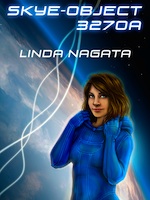 I completed a couple of writing projects in the ensuing years — a middle-grade novel and an epic fantasy — both very different from the sort of high-tech adult fiction I’d written before. No surprise — both failed to sell to traditional publishers. Meanwhile, I moved from HTML work into PHP programming — and for a long time I loved it. Programming possesses some of the enthralling complexity of novel writing, but with programming the goal is solid, explicit — you know when you’ve got it right, and that’s a very satisfying feeling. With fiction, right/good/quality is a much more nebulous affair, a matter of opinion, and you never really know if your work is as good as it can be or even good enough.
I completed a couple of writing projects in the ensuing years — a middle-grade novel and an epic fantasy — both very different from the sort of high-tech adult fiction I’d written before. No surprise — both failed to sell to traditional publishers. Meanwhile, I moved from HTML work into PHP programming — and for a long time I loved it. Programming possesses some of the enthralling complexity of novel writing, but with programming the goal is solid, explicit — you know when you’ve got it right, and that’s a very satisfying feeling. With fiction, right/good/quality is a much more nebulous affair, a matter of opinion, and you never really know if your work is as good as it can be or even good enough.
Still … did I really want to expend my creative talents building an ecommerce website so someone could over-charge for gourmet coffee?
Ha! Yes. After several years on the job, I literally asked myself this question.
It wasn’t a question I had to answer, though. I knew it was just a matter of time until the decision was made for me. Our programming shop had always been a money loser and it was clear we were not going to be around forever, so I stuck it out until I was laid off during the great recession.
As it happened, I was laid off with the right skills and at the right time to join the indie publishing revolution. By the spring of 2011 — twenty-four years after that first published story — I’d re-published most of my backlist as ebooks and I’d started writing original fiction again.
The lab rat had re-entered the maze.
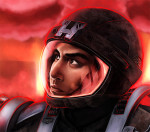 The rewards were small just as they’d always been, but for the first time I was in control of my work. I loved that. It was fun. And in 2014 the unexpected happened — my first science fiction novel in ten years wound up on the final ballot of the Nebula Awards. This stroke of luck turned into a nice traditional publishing contract along with a TV option. Hey, hey, hey! Twenty-seven years after that first published story I was finally on my way!
The rewards were small just as they’d always been, but for the first time I was in control of my work. I loved that. It was fun. And in 2014 the unexpected happened — my first science fiction novel in ten years wound up on the final ballot of the Nebula Awards. This stroke of luck turned into a nice traditional publishing contract along with a TV option. Hey, hey, hey! Twenty-seven years after that first published story I was finally on my way!
Uh, no.
Once again, just as with my first novel, everything seemed to go right except for that sticky part about selling enough copies to keep publishers interested. It brings to mind a line from the Roseanne sit-com, when the family’s electricity is turned off and Roseanne declares (I paraphrase) “Well, it was nice to visit the middle class for a while.”
Hey, it was nice to look like I was on my way … for a while.
I sometimes find myself metaphorically side-eyeing young writers who’ve hit it big the first time out. Does that early success give them a heady confidence that mutes the inner critic, slays the self-doubt, allows the words to flow? I imagine it does for some, though I know it doesn’t always work that way. Success can sometimes be as challenging as failure. On the other hand, success usually pays better.
And still she persisted…
I’m not done yet. Now, thirty years after that first published story, I’m getting ready to publish a new novel. “Once a writer, always a writer,” my agent says. Maybe this new novel will be the one to hit. Maybe not. That’s out of my hands.
What I get to choose is whether or not I make another play — and I’m grateful to have that choice. Being able to make that choice is a blessing not bestowed on everyone. Though my writing career has followed a crooked, stumbling path, life has been very kind to me. I’m still here, and I still have the time and the ability to continue writing for at least a little longer.
There are many other writers who could tell you a similar career story, many others who have persisted as long, or longer, than I have, some in far tougher circumstances. You know who you are, and I raise my mug to you! 
So what’s my end goal? To write a really damn good book of course, but also to finally win enough readers that my husband — who’s been carrying the load forever — feels secure enough to fully retire.
Thirty years is a long time to persist in this game, but I’m going to bang the lever at least a couple more times. What the hell. Maybe I’ll hit and have the ironic pleasure of hearing myself described as an “overnight success.”










 Home again and happy to be here!
Home again and happy to be here!

